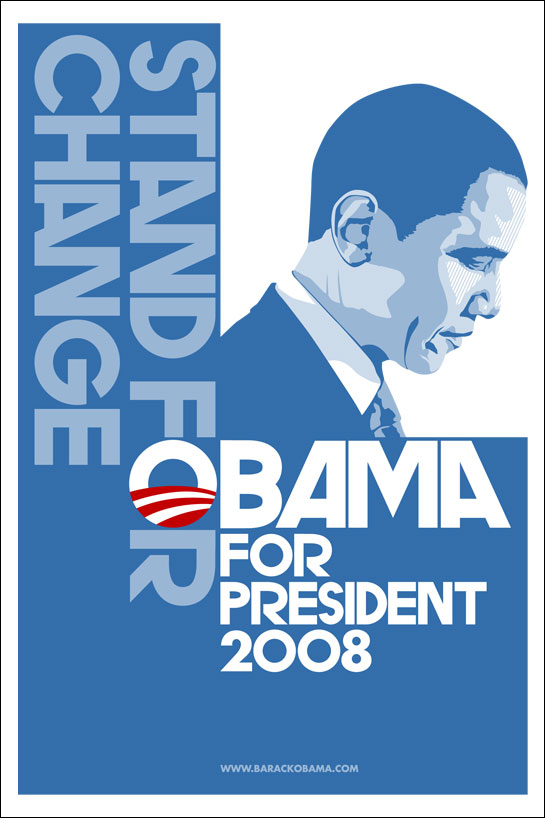File photo: Sen. Barack Obama criticizes Bush's warrantless-wiretapping program in a speech at Dartmouth College.
(Credit: Declan McCullagh/CNET News.com)In theory, Hillary Clinton should have been the perfect tech-friendly candidate in the Democratic race for the presidential nomination.
Practically from the moment she was sworn into office in 2001, the New York senator began wooing technology firms and their executives in preparation for her presidential bid.
She introduced five different broadband bills. She showed up at roundtables with chief executives like Microsoft's Steve Ballmer, Adobe Systems' Bruce Chizen, and Symantec's John Thompson. She spoke at a board meeting of the Information Technology Industry Council, whose members include Apple, Cisco Systems, Dell, eBay, IBM, Intel, and Microsoft. She talked up nanotech, lower taxes on stock options, and better e-voting security. She won a coveted endorsement from prominent venture capitalist John Doerr, and, in fact, won more votes in Silicon Valley during last month's California primary.
So just how did Barack Obama--who managed to retain his delegate lead despite losses Tuesday in Texas, Ohio, and Rhode Island--become the favorite in tech circles?
It shouldn't--again, in theory--have turned out this way. At the time Obama announced he wanted to be president, he had accumulated a mere two years of experience in the U.S. Senate.
The Illinois senator's tech-law forays were limited to topics like complaining that airline pilot uniforms were readily available for purchase over the Internet[1], and warning that TV networks had better tone down the amount of "adult content" in their broadcasts or Congress would do it for them[2]. An information-technology-in-health-care bill was co-sponsored with Clinton. And, in 2005, Obama even let his Barackobama.com domain name lapse--the ultimate politechnical misstep, solved only by a friendly domain auctioneer helping him out.
The only two Obama bills (of which he was the primary sponsor) that became law during those two years dealt with matters as unimpressive as naming a post office and doling out U.S. taxpayer dollars to the Congo. No wonder that his hometown newspaper, the Chicago Tribune, which had endorsed him during his Senate run, reported that Obama managed "to finish his first year without a signature achievement."
What propelled Obama to Internet-ional prominence was a combination of charisma, background, a remarkably well-received convention speech four years ago, and a willingness to embrace technology.
One 2004 article from CIO Insight said: "While the power of online marketing is still in its infancy, Barack Obama, the senator-elect from Illinois, has collected more e-mail addresses in some states than the senators from those states. Stay tuned!" The convention speech opened other doors; it led him to meet Warren Buffett, who in turn introduced him to Bill Gates and Donald Graham, chairman of The Washington Post Co.
Being relatively young and a favorite of political bloggers didn't hurt either. In August 2005, Obama was one of only four senators (Clinton not among them) with a blog, which he claimed he updated himself. He also--a rarity in a sitting senator-- engaged bloggers directly by posting a response on DailyKos.com about political litmus tests and judicial appointees. "It was a good opportunity to engage an activist community in a forum that is rapidly growing," Obama told the Washington Post at the time. "If you take these blogs seriously, they'll take you seriously."
From that beginning, it wasn't a huge leap to build a commanding presence in tech circles through mechanisms like an endorsement from Stanford law professor Larry Lessig, clever use of wikis, and the my.barackobama.com social-networking site. Obama's unambiguous opposition to the Iraq war and opposition to retroactive immunity to telecommunications companies certainly helped too.
In October 2005, during a Senate hearing, Obama said this to Ellen Sauerbrey, a Bush appointee to a State Department post: "It doesn't appear that you have very specific experience."
This also happens to be the same charge that Clinton is levying against her Illinois rival today. And it's proving no more effective; Sauerbrey ended up getting the job anyway.
Footnotes:
[1] Excerpt from Pantagraph (Bloomington, IL) newspaper, March 11, 2005: "U.S. Sens. Dick Durbin and Barack Obama, both Democrats, asked Congress to investigate the easy availability of airline pilot uniforms on the Internet after viewing a media report in which a reporter received a uniform without being asked for identification."
[2] Excerpt from The Atlanta Journal and Constitution, November 10, 2005: '"But if the industry fails to act-- f it fails to give parents advanced controls and new choices--Congress will," Obama said. He noted, however, that regulation is not the only answer and that the nature of TV sex is more important than the amount. "The adult content in 'Schindler's List' is far different from the type on 'Desperate Housewives,' " he said.'






No comments:
Post a Comment